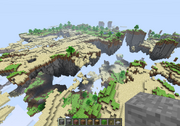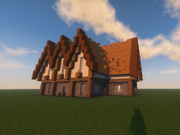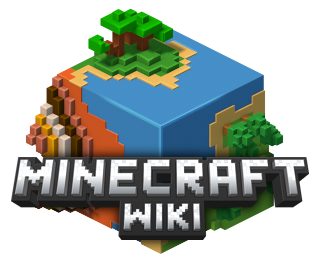Visit the FTB wiki for up-to-date, detailed modding information.

An example of a world generator mod (custom Indev map generator)

The "Optifine" mod that supports "shaders" in game which only changes the look. With different "shaders", Minecraft can look very different from Vanilla.
Mods (short for modifications) change Minecraft's game content from what it originally was.
Purpose
Most mods add content to the game to alter gameplay, change the creative feel, or give the player more options in how they interact with the Minecraft world. Most people who create mods for Minecraft: Java Edition (known as modders) either use Fabric or Minecraft Forge alongside the Mod Coder Pack to do so. Some mods may be bigger expansions, while others add more settings and options to optimize speed, graphics, or gameplay of the game. Server mods or plugins mainly give server admins more options and ease of use, and most mods for single-player have a server version that allows or optimizes the mod in multiplayer.
Ideally, the creator of a mod updates the mod whenever the game updates - bringing more content, bug fixes, or optimizations. Otherwise, the mod may not work with a newer version.
Mods are also available for Bedrock Edition via mcpedl.com on iOS and through apps such as "BlockLauncher (not updated)", "MCPE Master (not updated)", or "Toolbox for Minecraft: PE (currently only semi-functional)" on Android devices. Mods are not available for the Legacy Console Edition.
An official way of creating mods called Add-ons is available for Bedrock Edition.
Types of mods
Client-based
Client mods are modifications to your game files themselves. They are not custom clients, as they require modification of the Minecraft .jar file. They require mod loaders such as "Minecraft Forge" or "Fabric" and install a separate profile.
Most of the common mods in Minecraft 1.14 and higher require hooks that require Fabric API. Most common modifications for Forge usually are for Minecraft 1.12.2 or 1.7.4. There are also forge modifications for Minecraft 1.14.4 and 1.15.2, and there are very few modifications for MC 1.13.
Because the Minecraft server software ignores custom content from the client side, most of the client mods which add new content to the game do not work in multiplayer unless a modification has also been installed on the server. Some authors of client mods have made server versions of their mods available, and others have not. A few of the Loader/API type client mods (e.g. ModLoader and AudioMod) and many of the functional client mods (e.g. OptiFine or TooManyItems) have effect in multiplayer straight away, without any modification on server side.
Server-based
Server mods are modifications to the official Minecraft server software. They are commonly designed to make the administration of servers easier by implementing tiered privileges for commands (such as kicking, banning, etc.). They are frequently implemented as "wrappers" which do not modify the main server .jar file, instead of monitoring its output and sending commands to it.
Mod packs
Mod packs are collections of mods that have been put together and configured so that they all work together. Mod packs are often centered around a general theme like tech, quests, or magic. Mod packs often have either custom launchers or installers that make installing and running the mod pack easy. Some of the more popular mod packs are Feed The Beast, Tekkit, and Hexxit. There are of course also smaller mod packs, such as e.g. Crafting Dead and Foolcraft, most of which using the special Minecraft Technic Launcher from Technic Pack. Most mod packs can be found on custom launchers, which make it easy to install and launch various mod packs. The most popular of these are Technic, ATlauncher, and the new Twitch Desktop App. In addition to making it easy to install mod pack clients, certain launchers can also download server mod packs.
Bugs
If players installed a mod, it may stop the game from working properly. If they encounter a problem while using mods and want to report it, first remove all of the mods and see if the problem still happens. If the problem continues to happen, it can be reported on the bug tracker. Otherwise, try to reproduce the problem with the fewest possible number of mods, and then report the problem to the authors of those mods.
If Minecraft crashes, a modified game is flagged in the crash report.
The crash report text includes of of these lines near the bottom:
Is Modded: Probably not. Jar signature remains and client brand is untouched Is Modded: Very likely; Jar signature invalidated Is Modded: Definitely: client brand changed to (present loader, such as "fml,forge", "modloader", or "fabric") Is Modded: Unknown (can't tell)
A shortened example crash report is given below:
| Crash Report |
|---|
---- Minecraft Crash Report ---- // Uh... Did I do that? Time: 1/1/17 12:00 AM Description: Manually triggered debug crash A detailed walkthrough of the error, its code path, and all known details is as follows: --------------------------------------------------------------------------------------- -- System Details -- Details: Minecraft Version: 1.12 Operating System: Windows 10 (amd64) version 10.0 Java Version: 1.8.0_131, Oracle Corporation Java VM Version: Java HotSpot(TM) 64-Bit Server VM (mixed mode), Oracle Corporation Memory: 524288000 bytes (500 MB) / 536870912 bytes (512 MB) up to 1073741824 bytes (1024 MB) JVM Flags: 4 total; -XX:HeapDumpPath=MojangTricksIntelDriversForPerformance_javaw.exe_minecraft.exe.heapdump -XX:+DisableExplicitGC IntCache: cache: 0, tcache: 0, allocated: 0, tallocated: 0 Launched Version: 1.12 LWJGL: 2.9.4 OpenGL: AMD Radeon (TM) R9 999 GL version 9.9.99999 Compatibility Profile Context 99.99.999.999, ATI Technologies Inc. GL Caps: Using GL 1.3 multitexturing. Using GL 1.3 texture combiners. Using framebuffer objects because OpenGL 3.0 is supported and separate blending is supported. Shaders are available because OpenGL 2.1 is supported. VBOs are available because OpenGL 1.5 is supported. Using VBOs: No '''Is Modded: Probably not. Jar signature remains and client brand is untouched.''' Type: Client (map_client.txt) Resource Packs: Current Language: English (US) Profiler Position: N/A (disabled) CPU: 9x Intel(R) Core(TM) i9-9999Z CPU @ 9.99GHz |
The code that checks for mods is fairly simple, and it's not always correct; it may say 'probably not' even with mods installed. However, it's very difficult to get the 'very likely' message if you haven't modified your Minecraft .jar file somehow, so that's essentially a 'yes'. There's also a 'definitely' message, seen when a Bukkit server crashes and under other similar circumstances, like when the Minecraft Forge API is installed.
'Probably not' appears when the client/server brand appears to the in-game check to be unaltered (often termed 'vanilla') and the META-INF folder is still there. 'Very likely' appears when the META-INF folder is not present but the client/server brand seems to be vanilla. 'Definitely' plus the client name appears when the client is not vanilla. For example, you might see something like:
Is Modded: Definitely: Client brand changed to 'fml,forge'
Because of issues including (but not limited to) the bugs above, it is recommended that you use mods in a new world.
Mod repositories
A few websites have been established to host minecraft mods. The most popular of which is CurseForge. CurseForge is the site hosted by Curse LLC, which also owns all of Gamepedia (including Minecraft Wiki (this place.)). Gamepedia has recently been sold by Twitch to Fandom (Wikia), but the account link remains. FTB uses CurseForge.
Installing any mod comes with a risk: you are running someone else's software without necessarily knowing what it does. Using a well-moderated site and checking the source code may help to a degree, but you are still trusting someone else other than Mojang. This Wiki makes no guarantee on mods and is not responsible for any consequences of doing so.
See also
- Add-ons, a feature in Bedrock Edition that allows modders to more easily add content to the game.
- Cheating and exploits
- Mods/Installing mods for a guide on how to install mods.
- Mods/Installing Forge mods for a guide on how to install mods using Forge.
- Programs and editors/Modding showcases tools for installing and making mods.
| Modding APIs |
| ||
|---|---|---|---|
| Installation | |||
| Official | |
|---|---|
| Add-ons (BE) | |
